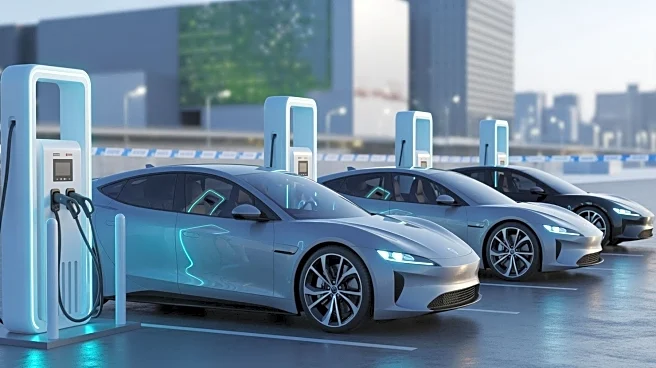What's Happening?
Oshkosh Corporation, a longstanding vehicle manufacturer, is advancing its production of zero-emission vehicles to support various sectors in the United States. Known for its diverse range of vehicles,
including fire trucks, delivery vehicles, and military transport, Oshkosh is now focusing on electric configurations. The company gained attention with its Next Generation Delivery Vehicle (NGDV) for the United States Postal Service, which can be equipped with either a zero-emission battery electric powertrain or a gas engine. Oshkosh's headquarters in Wisconsin showcased several electric vehicles, including autonomous trash collection units and airport ground support equipment. These innovations reflect Oshkosh's commitment to integrating electric and autonomous technologies into its offerings, aiming to improve safety, efficiency, and reliability across industries.
Why It's Important?
Oshkosh Corporation's shift towards zero-emission vehicles is significant for the U.S. as it aligns with broader environmental goals and the push for sustainable infrastructure. By offering electric options for traditionally diesel-powered vehicles, Oshkosh is contributing to the reduction of carbon emissions and promoting cleaner air. This transition is crucial for sectors like postal services and airport operations, where efficiency and environmental impact are key concerns. The adoption of electric vehicles can lead to operational cost savings and reduced dependency on fossil fuels, benefiting both the economy and the environment. Oshkosh's innovations may set a precedent for other manufacturers, encouraging industry-wide shifts towards sustainable practices.
What's Next?
Oshkosh Corporation is expected to continue expanding its electric vehicle offerings, potentially influencing other sectors to adopt similar technologies. As the demand for sustainable solutions grows, Oshkosh's advancements could lead to increased collaborations with government agencies and private companies seeking to enhance their environmental credentials. The company's focus on autonomous technology may also drive further developments in smart infrastructure, improving operational efficiencies in urban environments. Stakeholders, including policymakers and environmental groups, are likely to monitor Oshkosh's progress, advocating for supportive regulations and incentives to accelerate the transition to zero-emission vehicles.
Beyond the Headlines
Oshkosh Corporation's efforts highlight the ethical and cultural shift towards sustainability in manufacturing. The integration of autonomous technology raises questions about the future of labor in industries reliant on manual operations. As automation becomes more prevalent, there may be a need for workforce retraining and adaptation to new roles. Additionally, Oshkosh's innovations could influence public perception of electric vehicles, increasing acceptance and demand. The company's commitment to reducing environmental impact reflects a broader cultural movement towards responsible consumption and production, potentially inspiring similar initiatives across the globe.










